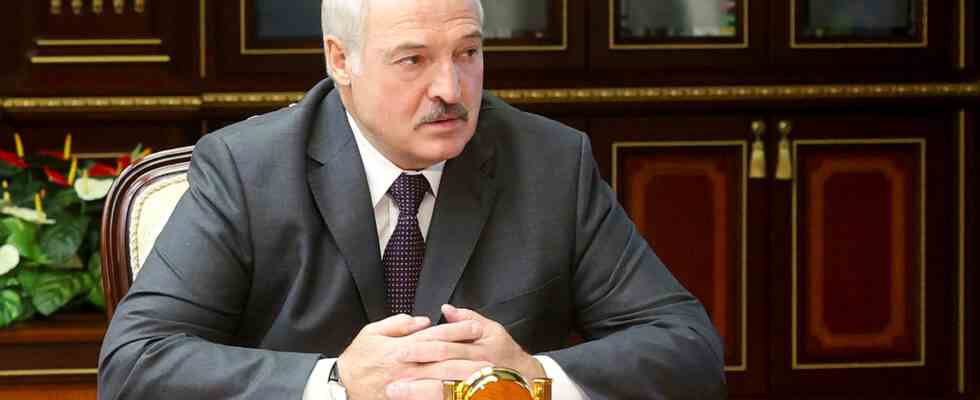Status: 08/04/2022 1:04 p.m
Two years ago, Lukashenko had himself declared the winner after a sham election in Belarus, and protests were brutally suppressed. Today he is firmly in the saddle. But he is more dependent on Russia than ever.
Alexander Lukashenko is in his element. He jokes with a couple of older ladies, who applaud his visit to a mall enthusiastically. He flirts with a young saleswoman, who smiles and offers him filled dumplings, his – as he says with a theatrical sigh – “great weakness”.
“I know the mood of the people”
Lukashenko loves performances like this – bathing in the crowd. The applause, the warm words that serve as proof of what he actually always knew:
We see how much we depend on each other and that we cannot live without mutual love and support. Let’s thank each other for continuing to strengthen and advance Belarus.
Even those who took to the streets two years ago, Lukashenko says in an interview with the French news agency AFP, have now woken up: “And many say, oh, we behaved wrongly. Believe me, I know the mood among the people. What would have happened if I had dropped everything and left in 2020? Then it would be worse in Belarus today than in Ukraine.”
Political scientist: Ukraine war has an impact
The reference to the neighboring country is no coincidence. In fact, against the background of the war in Ukraine, many Belarusians would rate their own situation much more positively, says the Belarusian political scientist Artyom Shraibman. The relationship to the power apparatus has changed. Also because Lukashenko has so far managed to keep the country out of direct combat operations.
As a result, acceptance within Belarusian society has increased again, says Shraibman. “Surveys in May and June show that the more politically neutral part has switched back to the side of the government after going to the opposition in 2020.”
Opposition in exile or in prison
An opposition that currently has no way of countering the repressive regime in the country itself. Those who challenged Lukashenko politically – such as longtime opposition leader Nikolai Statkevich or civil rights activist Maria Kolesnikova, who became the face of mass protests – are serving long prison sentences in prisons and camps. Others, like then-presidential candidate Svetlana Tikhanovskaya, were forced into exile.
Tichanovskaya is still on the road a lot and is fighting for attention and support for the Belarusian democracy movement on the international stage. But their support in the ranks of the exile opposition is dwindling.
Opposition is looking for perspective
The movement, says political scientist Shraibman, is now in a deep structural crisis. “Many different actors, activists and politicians are now attacking Tichanovskaya because she is not determined enough, does not set up an exile cabinet, does not act as president, does not found a liberation movement.”
Tichanovskaya also knows that a new perspective is urgently needed. The 39-year-old has therefore invited to a large opposition congress in Lithuania at the beginning of August, at which priorities, responsibilities and possible restructuring are to be discussed. The most important result of the two working days will be to decide together what needs to be done – “and that we will continue to work as a unified front,” says Tichanovskaya.
Lukashenko’s dependence on Russia is growing
A front of which not much is left in Belarus itself. Independent media, civil and human rights organizations were smashed, critical voices silenced. Dissidents from all walks of life are in prisons and camps or have had to leave the country.
Lukashenko is back in the saddle. However, according to political scientist Shraibman, not quite as firmly as before 2020:
He is becoming more and more dependent on Russia. The corridor in which he can maneuver has become much narrower. Closer than ever before in the history of independent Belarus.
Lukashenko is no longer just dependent on Russia’s economic drip. He has also lost military sovereignty. It is a gradual erosion of independence, which he actually never wanted to give up.
Resistance is nipped in the bud
It’s the price he pays for the power he’s not willing to give up, even after 28 years. It’s his Belarus, his people – “who voted for me and have supported me to this day,” says Lukashenko.
Anyone who doesn’t vote for him and doesn’t support him is risking his future, his freedom. The power apparatus continues to do everything in its power to nip any form of resistance in the bud. After all the violence, it will probably no longer be possible to break this resistance permanently.
Belarus: Two years after the sham election, Lukashenko is back in the saddle
Christina Nagel, ARD Moscow, August 4, 2022 10:48 a.m

